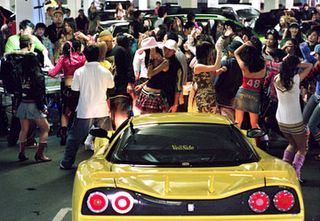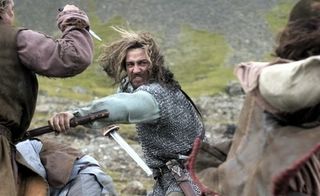The Fast and the Furious: Tokyo Drift

Drifting, class, is when you jerk the while driving at high speeds in order to glide horizontally around curves. I guess it makes you go faster or something. Perhaps it just looks kind of cool. No matter. This practice forms the basis for the latest installment of the Fast and the Furious saga, an explosive trilogy of racing-themed action films that dare to ask the question: what would happen if really bland guys drove fast next to one another?
The answer is...not much. Cars are wrecked, attractive and scantily-clad girls are suitably impressed, evil in the form of overly-aggressive street toughs is vanquished and energy drinks are advertised. That's about it.
Though the legend that is Paul Walker doesn't appear in this new film, making it the first Fast and the Furious movie without his nimble presence, the addition of hillbilly hero Lucas Black and his gratutious chatty hip-hop sidekick Bow Wow more than makes up for the loss of His Royal Dullness.
Good ol' boy Sean Boswell (Black) gets into a street racing accident, his third and most serious driving offense yet. He's racing against a full-grown Zachary Ty Bryan, known to fans of godawful sitcoms as Brad Taylor, Tim Allen's oldest son on "Home Improvement." It only took you ten years to get another part in something, Zach! Way to go, buddy!
After crashing and burning in the race, thus losing the chance to have sex with Zachary's girlfriend, according to the terms of their initial wager, Sean is given a not very difficult choice: Go and live with your deadbeat father in Tokyo or stay in America and go to jail. Hmm...Wonder which option he'll go for...Perhaps I can get into an auto accident and then someone will give me a free trip to Tokyo, all expenses paid. Might be kind of fun.
Once in the home of Sumo wrestling, Pachinko and open-air eel markets, Sean immediately locates and joins the underground drift racing community. I'm not quite sure how exactly he finds his way there. Perhaps they have signs on the freeway ("Big Empty Garage for Drift Racing, 5 km. --->").
In said big empty garage, Sean meets up with Bow Wow, who plays...get ready for this...a chatty, shifty wholesaler of questionably-obtained merchandise. It's such a nice break from the generic roles Hollywood typically doles out to young black men. You know, boring parts like research scientists, novelists, med students and high-powered executives. Maybe Bow Wow can branch out even more next time and play a professional athlete! Or a coke fiend! Remember what Biggie said, LBW, the sky's the limit! (Bow Wow's character is named Twinkie, Twink for short...Did no one have the heart to tell screenwriter Chris Morgan or director Justin Lin what that word means?)
Anyway, Sean and Twink fall in with the crime lord Han (Sung King) who hires them to...well, I'm not quite sure exactly. To drive around in circles, maybe. Or just to look good. This is a problem with all three of the Fast and the Furious epics. They never quite figure out how to blend the generic crime story in with the generic racing story. It's always this awkward fit - he's got to go undercover with the racing gang because they're pulling elaborate robberies or he's working for some smuggler that needs drivers who go really fast and drive recklessly, which doesn't make a whole lot of sense when you think about it for a few seconds.
This entry pretty much gives up on the crime story until the very end, when some embezzled money sets off a chain reaction that ends in...wait for it...a race down the side of a mountain! That involves a lot of drifting!
I say, they should just give up on the mobster/yakuza stuff in these films and focus only on the car races. Instead of going undercover with a criminal syndicate, the heroes should have to race cars in order to save a recreation center or something. "Guys, some greedy developer is gonna pave over the community center unless we can beat him in the big race! Come on, let's get to work, gang!"
I will admit that the racing scenes here look cool. In purely aesthetic terms, this is probably the best film in the trilogy. Stephen Windon's glossy, colorful cinematography gets as much mileage as possible out of shooting in one of the world's largest cities. From the massive glass towers to the bustling coastline to huge intersections thick with pedestrians, Tokyo's presented as a limitless cityscape stretchign endlessly in each direction, full of hidden rooms, back alleys and dark secrets.
Morgan's idiotic script doesn't capitalize on any of this one bit, mind you. It's just that the film looks nice and the racing scenes are well shot. They're also overloaded with bad CGI, including a ludicrous shot of a car's bumper skidding dangerously close to a concrete wall. The effect is downright cartoonish. But overall, that stuff is fairly well done. Definitely better than Singleton's pathetic second outing, which ranks just below Shaft on the Grand List of John Singleton Atrocities.
My problem isn't really the action this time around. It's just that any time a character opens his or her mouth, something stupid emanates outward and we have to sit there and listen.
Here's a choice example: "You're not just playing with fire. You're dousing the matches in gasoline."
And that's Morgan getting fancy. Most of the time, he just writes dumb, stock movie dialogue.
"I learned a long time ago that it doesn't matter, insider or outsider, as long as you go after what you want."
Blargh.
The fact that Black's Suh-thern drawal makes him sound like the drive-thru guy at the Tuscaloosa Frostee Freeze doesn't help matters. Also, the ending of this film makes no sense at all. Why would the big scary gangster want to wager the money owed to him on a silly car race? If Lucas Black owed him money and couldn't pay, wouldn't he just cut off his pinky or break his leg or something? Or, if this were a Takashi Miike movie, douse him in boiling oil and stick a hook through his cheek?
Just remember, if you're ever caught stealing from the Mob, challenge the boss to a car race, double or nothing. If he's not into car racing, perhaps a game of chess? These guys aren't unreasonable.
Beowulf and Grendel
Speaking of things that are unreasonable, the Icelandic-British-Canadian co-production of Beowulf and Grendel, which though outlawed by the Geneva Conventions may be permissably shown to prisoners by special request of the Commander in Chief. A revisionist update of English 10A's cruelest surprise, this movie practically begs for the glorious return of Tom Servo and Crow T. Robot. It's Clan of the Cave Bear for a new generation.

See, the thing is, though the epic poem Beowulf has historical importance - it's one of the earliest known narratives in the English canon - it's just not a complete story with any kind of contemporary resonance. It provides a lot of insight into the Scandanavian culture of its era, sure, but there's just not that much there from a cinematic perspective. Beowulf (Gerard Butler) repays an old debt to the Danish king Hrothgar (Stellan Skarsgaard) by killing a troll, Grendel (Ingvar Eggert Sigurðsson), who has terrorized the latter's Great Hall.
You see, in this version, Hrothgar killed Grendel's father when the unfortunate troll was just a boy. Whereas the monster is simply a beast that needs to be slain in the poem, here he's just a misunderstood outsider who is hunted because he's different. Yeah, it's stupid. Really really stupid. Stupider still is the new character of Selma, a witch played by Sarah Polley with a thick Canadian accent, a goofy red wig and extraordinarily anachronistic make-up. Here we are, it's Dane Land, it's about 500 A.D. People are living in caves and wearing animal skins and she looks like she's about to shoot an ad for Estee Lauder. Well played.
Her character is the only one who can communicate with the troll, Grendel, who speaks in gibberish like Jodie Foster from Nell. In perhaps the film's most ludicrous scene, Grendel barks out nonsense from atop a cliff while Selma "translates" below.
"The troll says, he loves San Dimas!"
Selma, something of a proto-feminist, understands that for the Danes, Grendel represents the metaphorical Other, the frightening unknown that threatens their tenuous understanding of the world around them. I don't know how she figured all this out while squatting in a cave. Maybe somebody left a set of Funk and Wagnall's sitting around in there.
So, it's all a bit much, what with the tender consideration of the monster's point of view and the constant allusions to this new-fangled religion they call "Christianity." I'm sure there's some theoretical way that a director with a really nimble touch could pull off this kind of a rewrite. You know, with subtlety, so the audience would slowly discover Grendel's essentially decent nature gradually over time and draw their own conclusions about the nature of the conflict. Screenwriter Andrew Rai Berzins prefers to club you repeatedly over the head with this idea like the non-proverbial hairy troll. This movie is so preachy and shrill, Ralph Nader has threatened to sue for copyright infringement.
But, really, the thematic content is the least of Beowulf and Grendel's problems. Though the landscape suitably stands in for early Medieval Norway (at least I think it's supposed to be Norway), and a few scenes do manage to capitalize on the majestic scenery of the area. (A shot of a Viking-style long ship navigating through icebergs made me wish these guys would forget the whole boring Beowulf angle and just make a cool Viking movie).
First off, as I alluded to already, the make-up is awful. Skarsgaard is fitted with an atrocious fake-looking red mane. Grendel just looks like a tall and oddly-shaped man with a lot of hair and goofy fur boots. Grendel's Mother, a fish lady, looks like an anorexic Creature from the Black Lagoon. Only less realistic.
As if that weren't bad enough, they've made an attempt to modernize a bunch of the dialogue. Oh sweet lord no. So instead of a direct translation from Old English, we get Hrothgar going off on "all these fucking trolls!" A lot of the lines sound like they could have been lifted from Will Ferrell in Anchorman. "Great Odin's Beard! We've got to do something about this fucking troll!"
Finally, I'd say the biggest problem with Beowulf and Grendel is that there's just not enough story for a 2 hour epic film. You'd have to actually make up some new stuff that happens to keep it interesting in terms of adventure filmmaking. Worse yet, they don't even bother to adapt the whole second part of the poem, when Beowulf actually becomes King. Instead, they spend almost all the time on the hunt for Grendel, an endless series of sequences in which guys in armor trudge around on rocks and hillsides looking for a monster, and then hurry through the fight against Grendel's Mom in the last 15 minutes.
Aside from a pointless romance between Beowulf and Selma, there's almost nothing actually happening in the movie. Characters stand around and discuss the fact that there's a troll about. Sometimes, they make jokes about fucking sheep. Other times, they drink beer (which I think should be called mead, which would be another example of the stupid and constant anachronisms). Sometimes, they drink beer and then joke about fucking sheep. Ah, maybe you had to be there...



